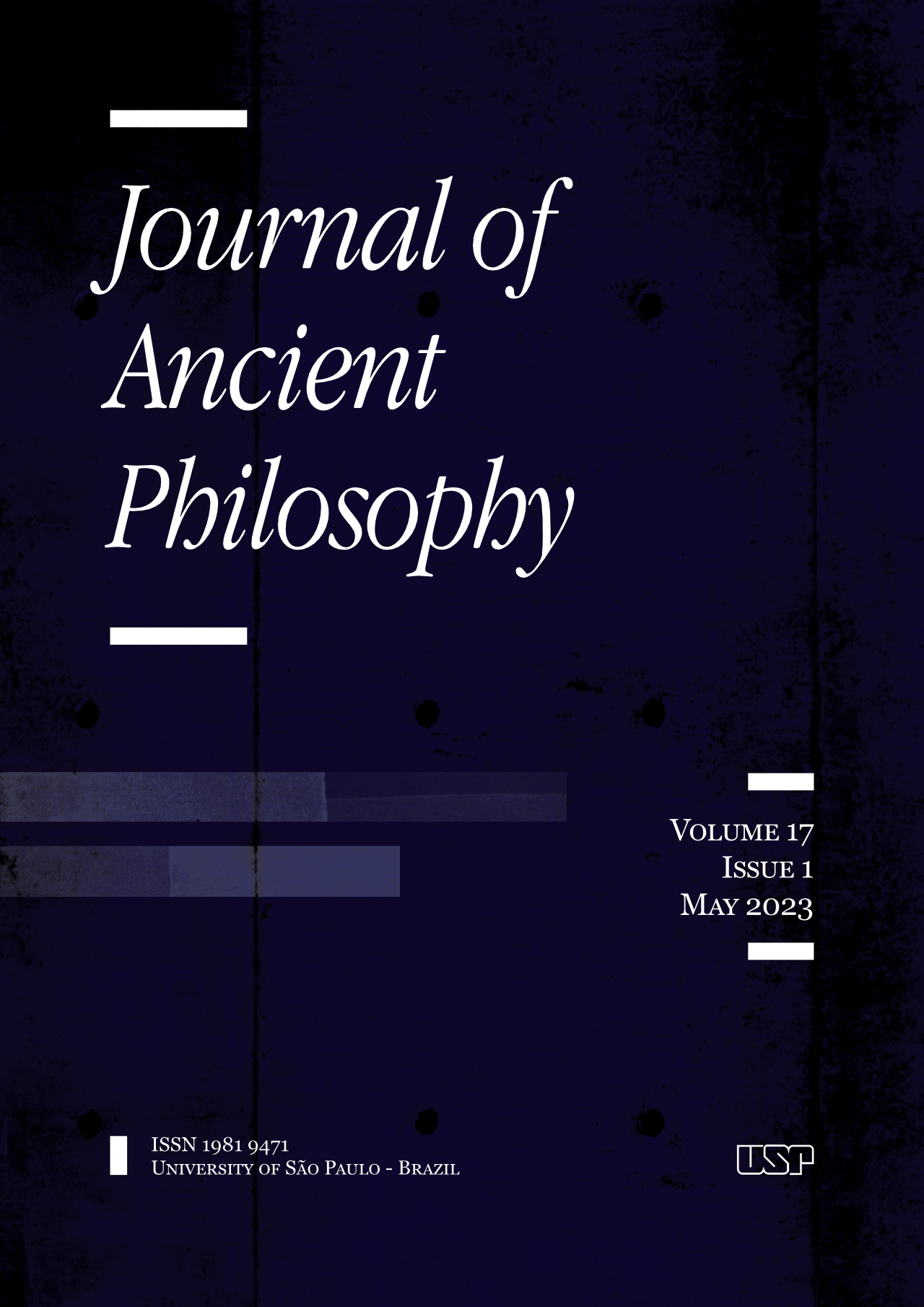The Problem of Modal Upgrading in Aristotle’s Apodictic Syllogistic
DOI:
https://doi.org/10.11606/issn.1981-9471.v17i1p96-120Keywords:
Aristotle, modal syllogistic, the two BarbarasAbstract
This is another contribution to the unending controversy over the two Barbaras. My approach to the problem is hopefully quite new: I wish to view the issue through the prism of modal upgrading. Modal upgrading occurs when a subject term that has only been predicated of assertorically in the premises is predicated of apodictically either: i) in the conclusion of a given syllogism, or; ii) in some proposition that is derived from either the premises of the given syllogism alone or the premises in combination with other propositions that do not refer to the proposition’s subject term. I call the proposition after it has been upgraded the upgraded proposition.
When a conclusion is the upgraded proposition, it is obviously a different predicate being predicated than was predicated in the premises. Aristotle endorses this kind of upgrading; it is effectively what happens in any valid mixed modal syllogism when the minor premise is not apodictic (e.g., Barbara LXL).
In other cases the upgraded proposition is not a conclusion but still follows from the premises alone. In these cases it is the same predicate being predicated in the upgraded proposition as in the premises, although the quantity of the propositions are different (one is universal, another particular). Aristotle rejects this kind of upgrading and takes its occurrence as sufficient to deny the validity of the given syllogism (e.g., Barbara XLL).
I will describe a third type where both the predicate remains the same and the quantity of the proposition remains the same as in the premise, e.g., the upgrading of “All C are B” to “All C are necessarily B”. In these cases it will turn out that the upgraded proposition is not derived from the premises alone, or at least, not syllogistically from the premises alone. This kind of upgrading too is reason for denying the validity of any syllogism from which the upgraded proposition follows as a consequence. I will show that Barbara LXL entails this kind of modal upgrading and should be rejected for this reason.
Armed with this notion of modal upgrading I want to attack the problem of the two Barbaras in Aristotle’s apodictic syllogistic. Aristotle himself endorses mixed modal Barbara when the major is necessary and the minor is assertoric, thereby endorsing the first kind of modal upgrading, but rejects Barbara when the minor is necessary and the major is assertoric on the grounds that it leads to the second kind of modal upgrading. Theophrastus endorses the peioram rule which rejects both Barbaras on the grounds that the conclusion can only be as strong as the weakest premise. Łukasiewicz endorses both Barbaras. I will argue that both Barbaras lead to unacceptable modal upgrading and should be taken to be invalid for that reason. Hence, I agree with Theophrastus about the two Barbaras; however, I do not endorse the peioram rule because I think that the negative mixed modal syllogisms generally avoid this problem and is mostly correct.
Downloads
References
Johnston, D.K. (1990) ‘Aristotle’s apodeictic syllogism’, Dialogue: Canadian Philosophical Review/Revue canadienne de philosophie, 29(1), 111-122.
Malink, M. (2013). Aristotle’s Modal Syllogistic. Cambridge, Mass. and London, England: Harvard University Press
McCall, S. (1963). Aristotle’s Modal Syllogisms. Amsterdam: North-Holland.
Mueller, I. and Josiah Gould (trans.). (2014) Alexander of Aphrodisias: On Aristotle Prior Analytics I.8 -13. London, New Delhi, New York, Sydney: Bloomsbury.
Patterson, R. (1995). Aristotle’s Modal Logic. Essence and Entailment in the Organon. Cambridge: Cambridge University Press.
Rini. A. (2011). Aristotle’s Modal Proofs. Dordrecht: Springer
Ross, W.D. (1949). Aristotle’s Prior and Posterior Analytics. Oxford: Clarendon Press.
Schreiber, Scott G. (2003). Aristotle on false reasoning. Albany, NY: SUNY Press
Thom, Paul. (1996). The Logic of Essentialism: An Interpretation of Aristotle’s Modal Syllogistic. Dordrecht: Kluwer.
van Rijen, J. (1989 ). Aspects of Aristotle’s logic of modalities. Dordrecht: Kluwer.
Downloads
Published
Issue
Section
License
Copyright (c) 2023 David Botting

This work is licensed under a Creative Commons Attribution-NonCommercial 4.0 International License.
Copyright
Authors who publish with this journal agree to the following terms:
- Authors retain copyright and grant the journal right of first publication with the work simultaneously licensed under a Creative Commons Attribution License (CC By 4.0) that allows others to share the work with an acknowledgement of the work's authorship and initial publication in this journal.
- Authors are able to enter into separate, additional contractual arrangements for the non-exclusive distribution of the journal's published version of the work (e.g., post it to an institutional repository or publish it in a book), with an acknowledgement of its initial publication in this journal.
- Authors are permitted and encouraged to post their work online (e.g., in institutional repositories or on their website) prior to and during the submission process, as it can lead to productive exchanges, as well as earlier and greater citation of published work (See The Effect of Open Access).


